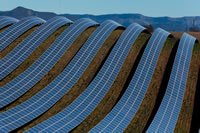The Solar Industry Has Paid Off Its Carbon Debts
 Robinson Meyer for The Atlantic: Think of all the energy that goes into making a single solar panel. Quartz and copper must be mined. The raw materials must be converted into wafers, then encased in protective material. And after panels leave the factory, they must be shipped all over the world.
Robinson Meyer for The Atlantic: Think of all the energy that goes into making a single solar panel. Quartz and copper must be mined. The raw materials must be converted into wafers, then encased in protective material. And after panels leave the factory, they must be shipped all over the world.
Now imagine these consequences spread over four decades—the environmental cost of the solar industry. Given all the research, development, and production time that goes into making any one panel, a skeptical solar-buyer might wonder: Has the solar industry on the whole really saved any energy at all? To that concern, a new analysis answers: Yes.
The solar industry probably paid off its long-term energy and climate “debts” in 2011, a study published this week in Nature Communications finds. Cont'd...
Comments (0)
This post does not have any comments. Be the first to leave a comment below.
Featured Product

